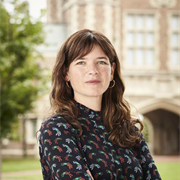Theatre and Performance Studies
Spring: n/a
Summer:
Overview
The Tufts University PhD Program in Theatre and Performance Studies trains scholar-artists to develop thoughtful and exciting research projects in performance studies, theatre and dance history, critical theory, and textual analysis. Our faculty specialize in illuminating how social and cultural formations — particularly gender, race, indigeneity, ethnicity, sexuality, colonization, religion, and class — inform performance both on and off stage. In turn, we support and celebrate interdisciplinary scholarship from our graduate students that centers shared concerns of performance, such as the body, repetition, liveness, and visuality, while at the same time taking up concerns in outside fields of inquiry.
Accepted students are guaranteed five-years of funding, which includes one year of fellowship and four years of teaching assistantships.
Program Outcomes
Through seminars and co-curricular programming, the Theatre and Performance Studies PhD program offers professional development opportunities in order to prepare graduate students for a wide variety of careers. As a graduate student in the program, you will engage in academic life in a variety of ways, including teaching, conducting research, publishing work, editing, directing staged productions, and more based on your interests.
Opportunities to develop and teach courses in students' areas of specialization exist within the department, at Tufts' acclaimed Experimental College, and through adjunct appointments across Greater Boston. Additionally, students serve as performance makers on campus and throughout Greater Boston.
Our students publish their work in leading journals, present at international conferences, and hold membership in professional organizations, including American Society for Theatre Research (ASTR), the Association for Theatre in Higher Education (ATHE), Dance Studies Association (DSA) and Performance Studies International (PSi). Students receive travel and research support on an annual basis, courtesy of the Sherwood Collins Fund.
Faculty believe in a wide variety of possibilities for life after earning a PhD, and offer strategies for navigating the academic job market as well as alternative job markets for students who wish to pursue careers in arts administration, editing, grant writing, higher education administration, library studies, publishing, technical writing, arts entrepreneurship, and the corporate sector.
Application Requirements
- Application fee
- Resume/CV
- Official TOEFL, IELTS, or Duolingo English Test, if applicable
- Transcripts
- Three letters of recommendation
- A personal statement no more than 1,000 words that addresses questions such as:
- Why this particular program?
- What sort of questions has your research turned up so far?
- How is performance central to your research questions?
- A writing sample that reflects a scholarly discussion of a topic in or related to theater and performance, broadly understood.
Tuition and Financial Aid
See Tuition and Financial Aid information for GSAS Programs.
Commitment to Diverse Voices
Gender, race, ethnicity, sexual identity, and class function as primary subjects of scholarly and performative inquiry for many projects undertaken by faculty and students alike. We believe that people of color, individuals living with disabilities, queer and trans people, and first-generation students produce new ways of looking and knowing, and we welcome students from underrepresented communities.
Hear from Students and Faculty
Faculty

Pannill Camp

Pannill Camp
Research/Areas of Interest: Theatre History and Intellectual History; Performance Theory; Social Theory; Phenomenology

Barbara Wallace Grossman

Barbara Wallace Grossman
Research/Areas of Interest: American popular entertainment, musical theatre, women in theatre, the Holocaust/Genocide on stage and screen, voice and speech, stage directing, theatre and social change

Kareem Khubchandani

Kareem Khubchandani
Research/Areas of Interest: Performance Studies; queer studies; South Asian studies

Paige McGinley

Paige McGinley

Lily Mengesha

Lily Mengesha
Research/Areas of Interest: Critical Indigenous Studies, Performance Studies, Gender and Sexuality Studies

Heather S. Nathans

Heather S. Nathans
Research/Areas of Interest: Race, Gender, and Ethnicity on the US Stage; Theatre and Social Justice; Prison Education